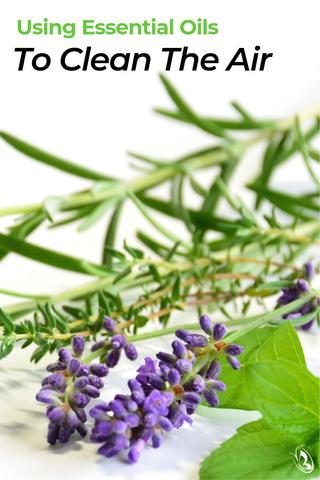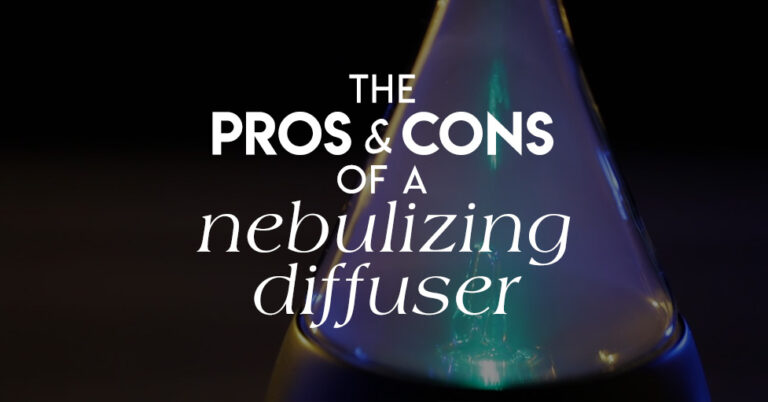Using Essential Oils to Clean the Air
According to research by the EPA, or the Environmental Protection Agency, we spend around 90% of our time indoors. This means that 90% of the air we breathe is indoor air, rather than the fresh air one would breathe while outside. Indoor air can be polluted with all types of allergens, and because they’re not seen, you typically don’t realize you’re breathing them in. These indoor pollutants can worsen allergy symptoms, they can exacerbate asthma, and they can leave you feeling run down throughout the day. For those with sinus conditions or easily irritated sinuses, these pollutants can even leave you feeling like you’re battling a cold you can’t quit, when it’s in truth the pollutants tricking you into thinking you’re getting sick.
Essential oils when diffused do a lot more than just aromatherapy, they can also help to cleanse the air you breathe. When using the right essential oils in your nebulizing diffuser, microbes, fungal spores, and other pollutants are no match, and you can reap the therapeutic rewards of the oils while simultaneously leaving your home with cleaner, fresher, and healthier air.
What Essential Oils Should I Use to Improve Air Quality?
Some essential oils are perfect for improving air quality, and others when diffused may release volatile organic compounds that can potentially irritate asthmatic conditions. For this reason, it’s important to know what essential oils to use in air purifying, and there are several you can choose from. The oils that work best for purifying and improving air quality are:
Lavender
Lavender essential oil is the natural soother, and there are a ton of uses for this oil in aromatherapy and air purifying. The antimicrobial properties of lavender essential oil has been shown to be effective in eradicating airborne fungi and bacteria within a span of 30 to 60 minutes, two of the most common airborne irritants found in the average home. On top of this air purifying benefit, you also receive the relaxation and tension relief benefits of the natural lavender scent. Because lavender has such a positive effect on sleep, and pure air aids in better rest, this is a great purification method to use before bedtime to achieve maximum benefit.
Thyme
Thyme essential oil not only has antibacterial properties to purify normal indoor air allergens, but this is the oil you want to purify air when seasonal bugs are making their round around your home. Not the insect type of bug, but the type of bug that you can’t see, the kind that gets your family down and out for weeks at a time especially during the fall and winter months.
Tea Tree
Tea tree essential oil is a superhero when it comes to antibacterial, antiviral, and antifungal properties. Cleansing the air with tea tree essential oils helps to rid the air of germs spread around during cold and flu season, while also taking care of spores and other common air allergens.

Why Clean the Air Using Essential Oils?
Purifying your indoor air is important, but do you know why? Poor indoor air can have quite a few effects on your health, and with how much time the average person spends indoors, these pollutants can really begin to take a toll on how you feel. Some of the most common effects of poor indoor air quality are sore throat, sinus irritation and congestion, cough, watery eyes, and even itchy skin. By keeping your air clean, you can help to alleviate these symptoms, and provide yourself with the air your body needs to feel its best without the irritation.
Pin It!



Useful info for my new diffuser!
Loved learning about aromatherapy oils and why we use them and the ones ok for my puppy
I love diffusing tea tree and lavender together!
This is awesome.
I use tea tree oil.
a big fan of you guys….orange is my fave
Thank you.
Very helpful information.
I hope you guys will continue to update this blog regularly.
I absolutely love my essential oils! Lavender and Orange are my favorites! Would love to try more essential oils! They are awesome!
This is a very well thought out article with lots of useful information,good job.
Always been a fan. I agree!
I’m very new to using EO’s, can’t wait ti try more
Shared all the useful information thanks
The diffuser and oils sounds great ty
I can’t wait to try Thyme for a fresher home <3
I love this and use a diffuser daily for this purpose!!
Thank you for sharing your knowledge here. I’m looking forward to learning more about defusing. If only I had thought using Thyme through this past winter.
This is a lot of really great information. I learned a lot reading it.
A great article; I am in recovery from NTM and very conscious of air quality. Knew about lavender, but looking forward to trying the tea tree and thyme. Thanks for the information!
Can’t wait to try the diffuser! I live in Dubai where it is very dusty and the a/c is on all the time.
I like the idea of diffusing thyme. I never thought of using it but it sounds great.
Great information, thank you!
I appreciate the information. I’m often wanting to freshen the air in my kitchen especially
I have COPD so I use either a BREATHE or Eucalyptus a lot. A neighbor stopped by today and could not stop talking about how good my apartment smelled. And I am in it but don’t really notice the scent.
Tea Tree is a must in our home it should no be run out. I am looking forward to try the EOs of organic aroma and counting the day until my order of Nebulizing diffuser arrived.
What about pets? Are there oils that should Not be diffused with animals in the house? Not just cats& dogs, how about birds? Or mist settling in fish tank water? Just curious for the creatures sake.
Will definitely have to add Thyme to my list!
OMG we SO need purification! I hope I win!
I love your essential oils. I have some of it and use every day. Now lavender and tea tree is my favourite.
I would love this
Different oils amazes me, citrus my fav to uplifting.
super
I love all these fragrances but I am dogs and I read somewhere that Teatree oil used in a diffuser is not good for dogs. I don’t know for sure if that’s correct or not As I can’t remember where I got the article from
This would work great with all my houseplants as they also help clean the air. Another great article from Organic Aromas
Did not
Know about thyme oil. Great article
I spend more time indoors the last few winters than when I was in better health, I have been fighting one cold virus after another so my strength is down. I am learning so much from your blog on how these oils can be helpful for so many things. I have rheumatoid arthritis which is flaring up creating more stress which equals more pain. Lavender is a scent I really find helpful, I rest and my mood is lighter. And I was familiar with Tea tree oil for personal care products but not for its essential oils, so much more to learn.
It’s good to know that we can do something to improve the quality of air we breathe at home by using the right essential oil. It’s a must-have essential oil for me. 😊💕
Thanks for the useful information on cleaning indoor air.
Thank you for the information! I love essential oils but never thought they can even use this way. Totally mind blower. I will try it out for sure 🙂
I’m trying to learn the best uses for essential oils and this article was very helpful.
I had no idea essential oils did so much
I have friends that visit that are smokers, would these be good for getting rid of that smell?
I’m slowly transitioning into a cleaner life by being conscious of every household cleaning product I purchase. I’ve asked my husband for a nebulizing diffuser for Mother’s Day and can’t wait to try all the different blends to help purify the air!
Love this!
Thanks for this useful information. I see (or should I say smell) cleaner air in my future!
Once I discovered essential oils I stopped burning candles and started diffusing. Citrus oils are my fav to diffuse, so uplifting and fresh.
I like to use orange when vacuuming to improve any smells of dust!
I use Lavender oil to clean the air
Lemongrass and grapefruit are two of my favorites
I adore all three of these oils.
Thanks for the tip!!! Just got one. Planning on getting a nebulizer to gift